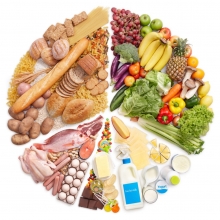What to eat before menstruation to does not transform from a Beauty into a Beast …
What is PMS?
Premenstrual syndrome is generally speaking a long list of persistent ailments and symptoms, appearing 7-2 days before expected menstruation. Only in rare cases, these symptoms last longer and are much more intense.
The nature of these symptoms allows to divide them into 4 categories:
• Type A (Anxiety), ie, nervousness, anger, irritability, emotional tension, mood swings.
• Type H (Hydratation), symptoms of water retention, weight gain, tenderness of breast, swelling of the extremities and abdominal bloating.
• Type C (Cravings), “cravings”, special interest in sweets and carbohydrates, increased appetite, and sometimes accompanying headaches, palpitations, chills, fatigue and drowsiness.
• Type D (Depression), associated with low mood, depression, crying, insomnia, trouble with concentrating.
Causes of PMS
Research on PMS conducted in 1980 by gynecologist M.D. G. Abraham demonstrated as important for women in the postovulatory phase (of course not only) is a way of eating. This is important not only in relation to the symptoms associated with PMS, but more important for the causes of these symptoms.
So you can distinguish the following possible causes of PMS:
• Luteal dysfunction (Luteal Phase Deficiency), associated with too high levels of estrogen, while too low levels of progesterone in the postovulatory phase. This situation is particularly characteristic for women with symptoms of PMS type A. In this case M.D. Abraham recommended supplementation with vitamin B, and consuming large amounts of dietary fiber (to reduce estrogen), and avoidance of animal fats and also supplementation with vitamin C (in order to improve the function of the corpus luteum), as well as supplementation of vitamin B6, magnesium and zinc (to normalize excessive prolactin release).
• Abnormal fluid retention, occurring with PMS Type H, has a strong association with elevated levels of aldosterone, secreted by the adrenal glands. Aldosterone causes the kidneys to retain salt and water, and it’s excess secretion in the postovulatory phase increases the loss of magnesium. Recommended in this case is reducing intake of dairy products and sugar, while increasing intake of green vegetables and whole grains.
• Hypoglycemia, is associated with excessive consumption of sugars and refined carbohydrates that stimulate insulin secretion, and this in turn lowers blood glucose levels. As a result, symptoms characteristic for PMS type C occurs. The secretion of insulin is regulated by prostaglandin E1, derived from linoleic acid contained in many vegetable oils. In order to ensure optimum levels of insulin in the blood it is necessary to supplement magnesium, vitamin B3, B6, C and zinc.
PMS Dietary Recommendations
• Large quantities of vegetables, especially green
• Whole grain products, beans, fish, poultry
• Essential fatty acids in the form of olive oil, sunflower oil, canola oil or flaxseed oil
• Moderate consumption of dairy products
• Reduced consumption of red meat
• Avoid refined sugar, trans fats, excess salt, alcohol and excessive amounts of caffeine
• Supplementation of magnesium, zinc, B-group vitamins, vitamin C
Other ways to deal with PMS
• Physical activity, especially outdoor, which helps reduce stress and improves mood, and also improves the quality of sleep.
• Maintaining appropriate and reasonable body weight affects the normalization of estrogen levels and thus prevents the symptoms of PMS.
• “Managing Stress” is easier, while ensuring optimal nutrition and regular physical activity.
• Adequate amount of sleep, especially in a properly darkened room, has a beneficial effect on levels of progesterone, also is an invaluable help in the fight against stress.
• Keeping your fertility Cycle Card, which will help you to assess the condition of your hormones, notice abnormalities and predict impending PMS symptoms and avoid PMS, by using the above mentioned guidelines.
Prepared on the basis:
M.A. Marilyn M. Shannon „Fertility, cycles and nutrition – self-care for improved cycles and fertility…naturally!”. CCL International, Inc. Cincinnati, Ohio, 2009.
G. Abraham „Nutrition factors in the etiology of the premenstrual tension syndromes”. The Journal of the Reproductive Medicine” 28:446-464, 1983.
G. Abraham, R. Rumley „Role of nutricion in managing the premenstrual tension symdromes”. The Journal of the Reproductive magazine” 32:405-422, 1987.



